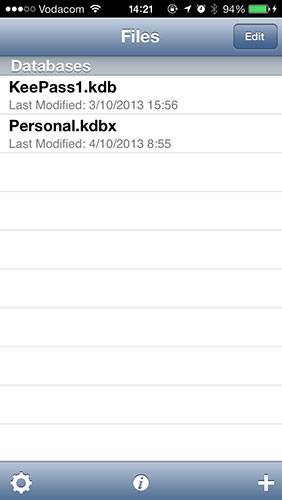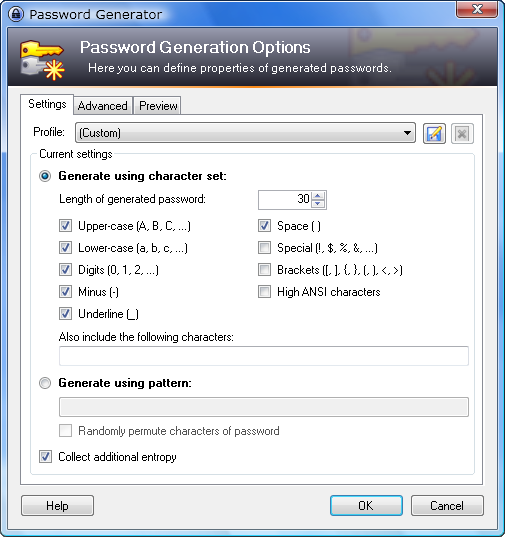KeePass Touch provides a secure password storage / manager on your device that's compatible with any KeePass Application on any device: PC, Tablet or phone. So you can get to all your passwords anywhere. Just remember your one Master Password and all your other passwords are safe & secure and you don't need to know any of them. KeePass is a very proven and feature-rich password manager and there is nothing fundamentally wrong with it. However, it is written in C# and therefore requires Microsoft's.NET platform. On systems other than Windows, you can run KeePass using the Mono runtime libraries, but you won't get the native look and feel which you are used to.
KeePassium is a part of the whole ecosystem of apps compatible with the KeePass password manager.


- KeePassium is an offline app. It will never ask for your server credentials. Instead, it integrates with the iOS Files app, and delegates all the networking to the cloud provider apps.
- This is a follow up video on my KeePass 2 tutorial. This time we're taking a look at the iOS (iPhone & iPad) version and how to set everything up so that you.
- Keepass is not able to open it 'File signature is invalid, either it's not a keepass database or it's corrupted' and in repair mode it just opens an empty folder. Keeping the mistakes done and safe practices for the future away, what methods of recovering a corrupted database there are?
The key idea is that your passwords are stored in an encrypted file (database). This file can only be decrypted with the correct master password. This way, only people who know the master password can access the stored passwords.
The master password is not stored anywhere. There are no backdoors or cheat codes, so if the master password is lost or forgotten, there is no way to restore it. You may want to write your master password on a piece of paper and keep it in a safe just in case.
In general, you can think of KeePassium as a specialized viewer/editor for password databases. Pretty much like Microsoft Word can view and edit .doc files, KeePassium can view and edit .kdbx files (“kdbx” stands for “KeePass database extended”). The app itself does not contain your passwords, everything is in the database.
Database sync
You can store your password database either locally on your phone, or in a cloud storage:
- Local (offline) mode offers somewhat higher security, since your database is never exposed to the Internet. However, you will need to regularly backup your phone: in case the phone is lost, you will still have all your passwords in the backup. Moreover, if you want to access your passwords from other devices (such as your laptop or PC), you will have to copy the database from the phone to the other devices manually. This might become annoying quite quickly.
- Cloud-stored database makes it much easier to synchronize your passwords across different devices. You just need to save your database in a cloud-synchronized folder (such as Dropbox, iCloud Drive, or similar). Some people are concerned about saving their database in a cloud, however they tend to forget that the file is very well encrypted (if your master password is reasonably complex).
Create your first database
Ok, now that we’re done with the theory, let’s get to the practice.
- If you want to use cloud storage, install and setup your cloud provider’s app. In this tutorial we will use Dropbox, but it can be any of the supported sync sources.
- Launch KeePassium and press
Create New Database - Make up a master password for your database. (Ignore the
No Key Filefield.) - Press
Save Database. - Now, select where to store the file: either locally (
On My iPhone/KeePassium), or in the cloud storage. (If Dropbox does not show among the available locations, turn it on.) - Press
Save - In the next screen, unlock the newly created database using your master password.
Congratulations, you are in your password database! Pc ram cleaner windows 10.
Create new entries
You can organize your entries in folders (groups). The new database already includes a few groups for your convenience.
To create new groups and entries, press the “+” button in the top-right corner. To remove them later, just swipe them to the left.
Protect your passwords
To protect your passwords from unauthorized access, make sure to secure the app with Face ID / Touch ID. Open the settings — App Protection, and turn on the App Lock switch. The app will ask you to setup a PIN (passcode). This way, you will be able to access your passwords when the fingerprint/face scanner fails to recognize you for some reason.

Setup Password AutoFill
Now that you have a few passwords in your database, let’s see how to use them. One option is to switch between apps to copy-paste the username, then the password — but this is a lot of actions that take a lot of time.
Luckily, you can make KeePassium quickly fill in login forms for you. This is a great convenience feature that works in all apps and websites. However, it needs some initial setup:
- Open device settings
- Scroll down to
Passwords & Accountsand press it - Select
AutoFill Passwords - Turn on the
AutoFill Passwordsswitch - Select KeePassium in the list
- Now, open any webpage with a login form
- Tap on the password input field. You will see your keyboard, with a
Passwordsbutton above it. - Press the
Passwordsbutton. This will open the KeePassium AutoFill screen. - Press
Add Databasebutton, navigate to your database in Dropbox and select it.
Now, whenever you press the Passwords button above the keyboard, you will see a list of accounts related to the current app. Press the account you need, and it will be automatically filled into the login form.
This guide is a work in progress. If you feel something is missing or could be improved — let us know.
Finding a good KeePass app for your iPhone or iPad can be challenging. Some apps are no longer maintained, others lack necessary features. This article will give you an overview of the current options.
KeePassium
KeePassium features a clean well-polished interface and makes KeePass easy to use. It is a lightweight app that respects your privacy: offline-first, no ads, no analytics.
- Main features
- AutoFill, TouchID/FaceID, kdb/kdbx3/kdbx4, attachments, TOTP, YubiKey, iOS 13 support
- Missing pieces
- TOTP is read-only
- Synchronization
- Automatic sync via system integration (Files app), using the original cloud apps. This way, KeePassium itself stays offline).
- Transparency
- Open source (GPL-3.0)
- Maintenance / updates
- actively maintained
- User support
- very responsive
- Ethics
- published a critical review of competing apps (you are reading it now)
- Price
- free (no ads, no trial period) + premium upgrade for convenience features
MiniKeePass
Note 1: as of 14 November 2019, MiniKeePass has been removed from the App Store.
Note 2: on 5 April 2020, MiniKeePass returned to the App Store with an announcement that the app will be retired by the end of the year.
Started in 2011, MiniKeePass is one of the oldest KeePass app for iOS. Unfortunately, it has been abandoned by its developers.
- Main features
- AutoFill, TouchID/FaceID, kdbx4, YubiKey, iOS 13 dark mode.
- Missing pieces
- No synchronization, no attachments, no kdbx4 support
- Synchronization
- none
- Transparency
- open source (GPL-3.0)
- Maintenance / updates
- none
- User support
- none
- Ethics
- all good :)
- Price
- free
KeePass Touch
KeePass Touch is a fork of MiniKeePass, but with more features and still maintained.
- Main features
- AutoFill, TouchID/FaceID, kdb/kdbx3/kdbx4, iOS 13 dark mode.
- Missing pieces
- no file attachments
- Synchronization
- in-app support of Dropbox, FTP and local Wi-Fi sync
- Transparency
- As a fork of MiniKeePass, KeePass Touch must make its source code public, but was reluctant to do so
- Maintenance / updates
- largely inactive for years, but had several major updates in 2019.
- User support
- none
- Ethics
- questionable
- Price
- free (with ads) + one-time purchase to hide ads
- Misc
- Technically, KeePass Touch is not allowed on the App Store due to the AppStore-vs-GPL conflict. One complaint from a MiniKeePass contributor, and Apple will remove KeePass Touch from the App Store.
Strongbox
Strongbox Password Safe supports KeePass format since 2018.
- Main features
- AutoFill, TouchID/FaceID, kdbx4/pwsafe formats, TOTP, iOS 13 dark mode, very customizable.
- Synchronization
- in-app integration with several clouds, and iOS Files app.
- Transparency
- open source (AGPL-3.0)
- Maintenance / updates
- actively maintained
- User support
- very responsive
- Ethics
- all good, but finds inspiration in KeePassium :)
- Price
- free (some features disabled after a trial period) + paid premium
PassDrop 2

- Main features
- opens KeePass 1.x
kdbdatabases - Missing pieces
- everything else, even no support for key files
- Synchronization
- none
- Transparency
- open source (AGPL-3.0)
- Maintenance / updates
- abandoned
- User support
- none
- Price
- free
KyPass 4
Keepass Ios Nextcloud
KyPass is one of the oldest KeePass apps on the App Store. It has a rather unconventional design, but is packed with features.
- Main features
- AutoFill, TouchID/FaceID, kdbx4/pwsafe formats, TOTP, InputStick,
- Missing pieces
- no iOS 13 dark mode
- Synchronization
- in-app integration with several clouds, and iOS Files app.
- Transparency
- proprietary, closed source
- Maintenance / updates
- actively maintained
- User support
- hit-and-miss, response time varies
- Ethics
- “borrowed” other developer’s code, removed inconvenient questions, and systematically abandons its paying customers
- Price
- one-time purchase (of the current version only)
AuthPass
Cross-platform app that supports KeePass format. Available on iOS, Mac and Android.
Review coming soon.
Keepass Ios Autofill
- Transparency
- Open source (GPL-3.0)
- Maintenance / updates
- under development
Keepass Ios App
MiKee
New app in beta stage.
Review coming soon.
- Transparency
- Open source (GPL-3.0)
- Maintenance / updates
- under development
There is a direct link to each app, feel free to try them. If you need best quality, reliability and support — get KeePassium.
Keepass For Ios
Last Updated: 2020-04-07
